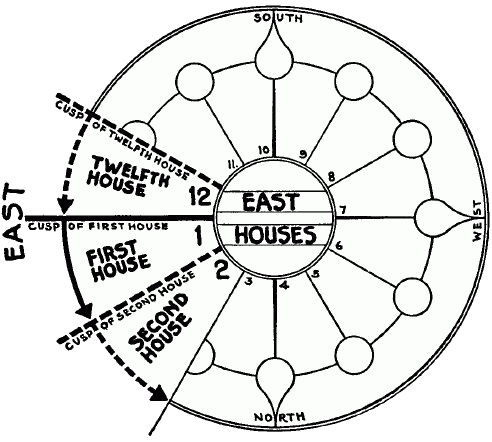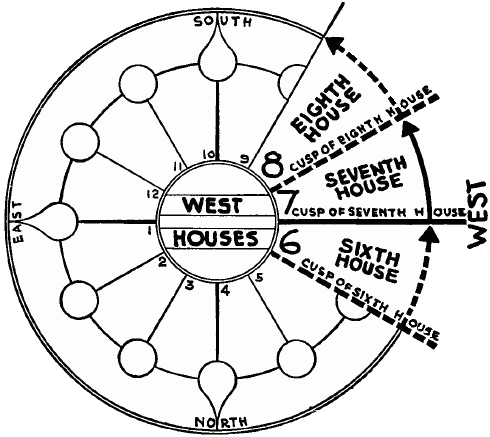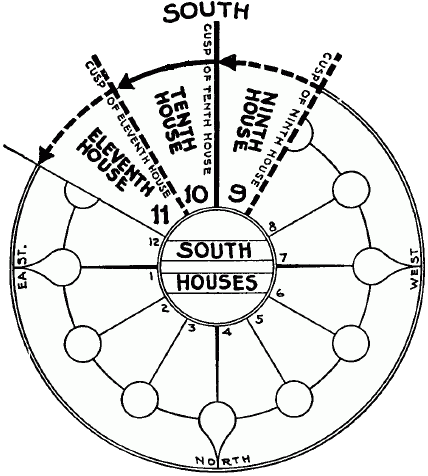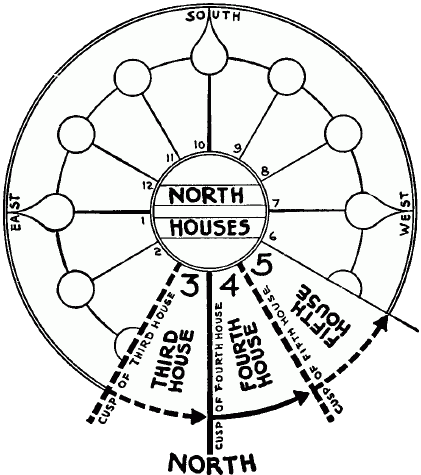Chapter Two
WHAT ARE THE HOUSES?
Beginners often make astrology difficult by trying to make everything "different," mysterious or a kind of hocus-pocus. The more unfamiliar anything becomes, the harder it is to learn, to understand or to use. This applies to the houses of a horoscope in particular. Therefore it might be well for the beginner to ask himself, what is a house?
Most simply, a house is a place where someone lives, and in the horoscope it is a place where a planet or a group of planets is located. The heavens are first divided into quarters, or four segments, by the two lines which distinguish between "east" and "west" in the one case, and between "south" and "north" in the other. Then these quarters are each divided into three "houses," so that there are twelve in all.
The idea is that, astrologically, man lives in "many mansions." Each of the twelve indicates one of the many divisions in his experience. He is like the wealthy individual who has a city home for social prestige, a room at the club for times when business alone brings him to town, a country estate in the north for summer and another in the south for winter, a lodge in the mountains for hunting or fishing, and so on. Life has different levels, boundaries and facilities for various ways of acting, and the houses are the first of several means by which astrology measures or reveals man's destiny in terms of the special conditions under which he meets its demands. The degree to which an individual has his life focused or emphasized in one or another of its departments of experience is indicated by the place of the particular planets in particular houses.
The easiest approach to the houses is to see them as an expression of "east," "west," "south" and "north" influences in a horoscope. In other words, the beginner can build on what he has learned in the opening chapter. The arrangement at the east can be shown by a diagram.
The central line pointing east has been shown in heavier inking, and the solid arrow indicates that the house extends from the heavy line, or what is known as the "cusp," in a direction opposite to that moved by the hands of a clock. Incidentally, nearly everything in astrology is taken counterclockwise in this fashion.
The line at the beginning of the easternmost house, rather than the center of the house itself, is pointed directly eastward. The reason for this is that the cusp or threshold of the house has a special significance. It is like the front of a building, which represents the whole inside arrangement, and yet does not make the interior any less important.

The primary eastern house is known as the "first house" of the horoscope. Two other houses are more "eastern" than either "northern" or "southern." Thinking always counterclockwise in getting at the basic meaning of astrological details, the house behind the first is known as the "twelfth," and the one in front as the "second." The point of view in this numbering is that of the planets moving through the houses counterclockwise, from the first into the second, and so on. The diagram indicates the span of the twelfth and second houses with a dotted-line arrow in each case.
The Meaning of the Houses
Now what do the houses mean? This is easy to learn if the first chapter has been mastered. While the house "rulerships" or meanings given here are simple, they are accurate in every respect. The more refined indications in the possession of a skilled astrologer are only a further application of these basic relations.
The "east" represents the control of circumstances, or the full and free ability to make decisions. Here is where "a man is a man." Thus the most definitely eastern house, the first, is said to rule or govern "personality."
What the Planets Do
When any planets are "in" a house, they are like tenants who live there. Just as the people dwelling in an actual house will give it color and atmosphere, so planets in the first house give active characteristics to the personality of the native.
There is one planet in this first house, in the chart of the resourceful lady, and it had everything to do with the manner in which she built up her business. Because it was the moon, it gave her the approachability or graciousness which became a large factor in her success. Had it been another planet, she would have solved her problems no less by her own free efforts, but with a different "color of personality," according to the nature of this other planet.
What has been said about planets entirely or largely east will always hold, and whatever is indicated by a planet in the first house also will always hold. The many possibilities of patterns in the chart are matched by an equally large possibility of combinations in life itself. Each "look" at a chart is complete, or correct in its own terms. All the various "looks," if taken carefully and completely, will be matched by a single confirmation in the life itself.
Empty Houses
One detail of horoscope interpretation requires special attention at this point. The beginner will note that the first house contains no planets in any of the cases of Woodrow Wilson, Queen Victoria and Martin Luther. This means that there is no planetary tenant, but it does not indicate that the person is devoid of personality. Rather, the presence of a planet in a house means a special emphasis of the affairs of that house in the total or "social" life of the individual.
Personality was not in any way an issue in the careers of these last three. President Wilson was aloof, and the effort to get him called "Tommy" remained a considerable joke. The queen equally lived in a realm all her own, whether she shared this with her uncle, later with her husband, or finally with no one at all for most of her reign. Martin Luther was a difficult and depressing individual on the personality side. The three had "personality," but the personality was not emphasized as it was in the case of the resourceful lady.
There is a special relationship of some one planet to each of the houses as a ruler or "lord," or as more an owner than a tenant. This will show how the personality is used by the native, whether or not it is emphasized in the primary sense. The point is of no present value to the beginner, however, and its consideration follows more naturally in a later chapter.
The Grouping of the Houses
The central house at the east side of the horoscope, as the place where the native's personality has its astrological indications, is related to a house behind it, and one ahead of it, in a special charting of the personality's activity. Of these the twelfth house rules whatever personality unwittingly carries along with it, and thus it governs the hidden elements in the choices or the self-direction of life. This is for better or worse, as the case may be.
Astrologers call the main or central houses "angular," and the supporting ones behind them "cadent." Thus the first is angular, and the twelfth cadent. What "tags along" with personality can be described as personality's "skeleton in the closet," its lingering moods and fears, or its hidden obligations. This may mean "self undoing," and it may attract hidden enemies, imprisonment and all types of confinement. It also indicates the hidden sources of strength by which the personality builds as well as destroys itself from within.
This twelfth house was most disliked by the old astrologers, with the result that their books paint a rather terrible picture. The fact that it can work as well for good as bad is shown in Queen Victoria's case. The five planets there brought many wonderful things to pass. None the less the major events of her reign were "cadent" in the sense that they took place around and behind her.
The house ahead of the "angle," here the second, is always known as "succedent." This is an unfortunate word, as it emphasizes the secondary or clockwise point of view by which the sun "rises" in the east daily, and by which planets in the second house, carried along by the turning of the whole heavens, will "rise" after those in the first, even though by their own normal motion in the skies they must move on counterclockwise into the third. The succedent house fundamentally is the "prospect ahead," or what lies in store tor the native in each of the four basic directions of his life.
The second house rules everything available for strictly personal use. Compared with the twelfth house, where personality is supported, or is both strengthened and weakened out of past experience and general background, the second is where personality expands itself, or where the native "spreads himself" among his fellows. Basically it rules resources, and this among other things is money, or the general medium of exchange by which an individual most easily broadens his experience.
The spreading of personality, or this definite use of resources, is illustrated by the four example charts. The resourceful lady and Martin Luther have planets in the second house. Their careers required that they have the means for free contact with many people and situations. Queen Victoria and Woodrow Wilson, who by contrast were more like the actors in a drama, have no planets in the second. In the latter two instances there was never any real problem of personal means, but in the first two cases the entire lives consisted of a quest for new foundations and resources, financial in the lady's case and institutional in Luther's.
The Houses at the West
The west group of houses includes the seventh as the angle, the sixth as its cadent or supporting neighbor, and the eighth as its succedent or expanding associate. Emphasis of the west side of the horoscope has been seen to be the "table d'hôte situation" in general experience. The seventh house, therefore, represents a focus of relationships in which it is necessary to defer to others, or work with others. This most simply is partnership in one form or another. The seventh house, in consequence, rules marriage, and all other coresponsible working arrangements in life, even to sharp competition and open conflict, or opportunity in general.
Queen Victoria is the only one of the example cases with a planet here, and she is the only one of the four who had to work in strict cooperation with the wishes and desires of someone other than herself. This was exceptionally exaggerated in her early years.
A curiously dramatic illustration of the way in which the horoscope can be interpreted by intelligent "looking," taking each judgment simply and completely by itself, is found in the fact that Woodrow Wilson's chart was initially understood by noting how all his planets are west, and is further delineated now by noting how his seventh house, the most "west" of all the twelve, has no planets in it. Thus his life is quite "westlike" in every respect, but with its "westness" never the basis for a struggle. In other words, the American president was a remarkable example of an individual swept along by a species of broad destiny, and yet he was never sensitive to anything of the sort; it was never an issue in his mind.
The sixth house, as the "support" of these general partnerships with others, rules the type of relationship which has become hidden or limited, for better or worse, on the analogy of the twelfth house. The sixth, therefore, becomes the house of servant-relations, indicating both the people who wait on the native and the attentions he must give to others as a "servant" in turn. It also indicates the direct service he must give to his own affairs, as this takes the form of "work" or becomes a personal maladjustment in the form of "sickness."

Woodrow Wilson, of the example charts, alone has planets here, and his whole career was one crisis after another over his "servant relation" to those about him. The dramatic climax was the historic battle over the Versailles treaty and the League of Nations. He was not, like Queen Victoria, a partner with a governing ministry. Neither the resourceful lady nor Martin Luther found any issue whatsoever in the question of whom they should serve, and how; or who in turn should wait on them, and carry out their wishes.
The eighth house, as the expanding possibilities of partner relations, rules legacies, or the means made available by others for the spread of personality. It thus has considerable analogy to the second house. As the partner-aided spread of personality it governs regeneration, or the development of character along the lines of ideals held by other people; and also rules death as a final chapter in regeneration. The old astrologers found this house almost as difficult as the twelfth, and in consequence said that it was an unfortunate place for the planets. Actually the meaning of the house is quite simple. It always indicates how the native can help others, or how they can help him, in any genuinely reciprocal relationship.
Queen Victoria and Woodrow Wilson have planets here, and this reciprocal activity was a matter of great concern in their lives. In fact, both were chief executives of countries at a time of great change, or unusual national development. Both had much to do, whether directly or indirectly, with a sudden expansion in the destinies of their respective peoples. On the other hand, nothing of this sort was at issue in the careers of the resourceful lady, or of Martin Luther. They were both essentially individualists, quite unmoved by any personal sense of obligation to other people or groups.
The Houses at the South
The south group of houses includes the tenth as the angle, the ninth as its cadent or supporting neighbor, and the eleventh as its succedent or expanding associate. Emphasis of the south hemisphere, or what astrologers often term "all planets above the earth," has been seen to indicate a wholly objective life; that is, one lived in the outer or visible give-and-take of everyday experience. The tenth house rules the general position of the native among his fellows, or his struggle to gain and maintain such a position, and so most simply governs "place in life." This is sometimes described as "honor."

It will be observed in the example charts that there is no emphasis here for Martin Luther. His position in life was assured by the fact of his priesthood, and so it was never an issue. The planet in the cases of Woodrow Wilson and Queen Victoria indicates that the president had to struggle in order to hold the place into which he was catapulted by events, and that the queen faced real problems in giving the British monarchy the new foundation in influence for which she was largely responsible. The great number of tenth-house planets in the chart of the resourceful lady is indication of the special degree to which this one out of the four example cases felt impelled to carve out a real position of her own.
The ninth house, as the support of the place in life, most simply rules "knowledge" or "understanding"; the wisdom by which an individual retains his proper place among his fellows. This involves ideas in nearly every form, and astrologers therefore look to this house for indication of religion and conscience. It shows the intellectual or abstract tie with things at a distance, as well as any practical efforts made to realize or maintain these ties, and it includes the travelling which involves a definite change of base, both temporary and permanent, or what astrologers identify as "long journeys."
Because none of the four example charts have planets in this house, none of these people experienced critical issues of understanding, or of distant associations, in any real sense. This means that each, in his own mind, knew exactly what he was about; that no one of them felt under any necessity to question his own intellectual background.
The eleventh house, as the expanding possibilities of public position, most simply rules friendship in personal terms, and hopes or objectives in a more impersonal way. Queen Victoria and the resourceful lady are the two, out of the example cases, with keen sensitiveness to their need for a real response to their ideals and efforts; and they are the only ones with planets in this house. They alone recognized the existence of a problem in their public acceptability. The queen sought to establish the real influence of the monarchy and the resourceful lady wished to build good will for her business enterprise. Neither Woodrow Wilson nor Martin Luther had any critical concern over their own goals as such, and they were unaware of any problem in the direction of their efforts. Both were obsessed with the creative tasks which engrossed them, and inclined to expect an almost unquestioned acceptance of their accomplishments by everyone around them.
The Houses at the North
The north group of houses includes the fourth as the angle, the third as its cadent or supporting neighbor, and the fifth as its succedent or expanding associate. Emphasis of the north hemisphere, or of "below the earth" affairs, has been found to indicate a specially subjective experience, and this is centered at the fourth house as ruler of the inner or private life of the native, in direct contrast with the tenth house. The rulership is most simply expressed as "home." It is also the "end of life," or the end of any cycle of events, when the values of the experience are established for all to see; i.e., the stage when things "come home" to people, or have their final influence. In this connection the house is often said to indicate the native's soul.

Queen Victoria, alone of the four example cases, has no planets here. There was not only no real issue, as far as her own inner impulses or subjective doubts were concerned, but the rigid discipline of her upbringing was planned deliberately to eliminate anything of the sort. A pressing sense of deeper necessities, and of very great problems in end-results, was a dynamic driving force in each of the other three individuals, even though this was a very personal or narrow matter in the instance of the resourceful lady.
The fourth house, as ruler of the home, and the tenth, as ruler of the public life and business relations, are together the indicators of the parents. There is considerable dispute among modern astrologers over which house rules which parent, and the beginner will have to make his own ultimate choice. In general, however, it is safe to say that whichever parent touches the native most importantly in terms of his place in life is indicated at the tenth house, and whichever one influences him more through the deeper and inner stirring of the soul is indicated at the fourth.
The third house, as the support of the "home," rules the general familiar and practical surroundings of the native, or indicates his "environment." This includes brothers, sisters and all blood relatives other than parents and children. It embraces all the conveniences of everyday existence in a most complete way, from means of communication to tools of every sort. Books are included on the one hand, and transportation on the other. Thus the house reveals the movement around the normal vicinity in what astrologers call "short journeys."
None of the four example horoscopes have planets in the third house. Like the ninth, this was a department of life in which issues were never raised, in which there was never need for real questioning in any of these cases. Here were people thoroughly settled within their own being, as far as their ordinary surroundings were concerned. The petty details of their efforts were never a problem.
The fifth house, as the expanding possibility of the inner or deeper side of life, rules the native's basic "self-expression." It indicates amusements and relaxation as well as artistic or "creative" efforts. "Home" potentiality may take the form here of speculation and gambling, in an anticipation of values, or it may govern courtship and children as a tangible effort to expand the values which are already embodied in self.
Martin Luther and Woodrow Wilson have planets in this house, which shows that they sought to make a creative contribution to their age, and that their self-expression was a matter of real issue. This would hold no less in failure than in success, as illustrated in Wilson's effort to set up a league of nations. Queen Victoria and the resourceful lady, on the other hand, faced no problem at this point. Neither of them had any genuinely creative sense of a work to do, or of new ground to break, such as was true of the two men; they merely sought to do well what many others had done before them.
Summary
In summary, what has the beginner learned in this second chapter? He has found that the directions east, west, south and north, by which he has been able to make his first steps in looking at a horoscope, are the basis for a division of the heavens into four parts. He has seen that the four quarters are each divided further into three houses of the horoscopes, making twelve in all. He has found that when planets rest in these houses, the corresponding departments of life are shown to be at a stage of issue or crisis.
He is ready now to distinguish the planets, one from another, so that he can give more specific judgments about the native. In the meanwhile he has learned the fundamental meanings of the houses, and it will pay him to review these very carefully before undertaking the next step in astrological understanding.
| First | Personality |
| Second | Resources, Money |
| Third | Environment, Brethren, Communication, Short trips |
| Fourth | Home, End of life, Deeper-link parent |
| Fifth | Self-expression, Speculation, Children |
| Sixth | Servants, Service, Sickness |
| Seventh | Partnerships, Competition, Opportunity |
| Eighth | Legacies, Regeneration, Death |
| Ninth | Understanding, Religion, Long Journeys |
| Tenth | Place in life, Profession, Outer-link parent |
| Eleventh | Friends, Hopes, Objectives |
| Twelfth | Hidden support and limitation |

Home | About | Blue Letters | Marc Edmund Jones | Greetings from Members | MEJ Books | Contact
Copyright © 1973-2014. All rights reserved.